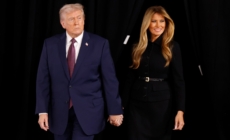-
Washington Post Begins Sweeping Layoffs - 8 mins ago
-
How Melania and Donald Trump’s Favorability Ratings Compare - 42 mins ago
-
Two Chinese Journalists Are Detained for Reporting on Corruption - 52 mins ago
-
Trump Repeats Call to ‘Nationalize’ Elections, as White House Walks It Back - 2 hours ago
-
A first look at Elephant Valley inside San Diego Zoo Safari Park - 2 hours ago
-
Ex-Capitol Police Officer Harry Dunn Seeks Maryland House Seat - 2 hours ago
-
Tax billionaires, cut rents and other takeaways from California’s first gubernatorial debate - 3 hours ago
-
Russia and Ukraine Resume Talks After a Huge Attack by Moscow - 3 hours ago
-
Are We at the End of the Industrial Age? - 4 hours ago
-
Renee Good’s Brothers Call on Congress to Rein In Immigration Crackdown - 5 hours ago
China and India’s Top Officials Meet Amid Tensions Over Pakistan, Border
Subrahmanyam Jaishankar, India’s top diplomat, met with senior Chinese leaders in Beijing ahead of the Shanghai Cooperation Organization’s (SCO) foreign ministers’ summit.
The trip marks Jaishankar’s first to China since 2019, before the deadly June 2020 clash in the Galwan Valley in the porous, de facto Sino-Indian border in the Himalayas.
Newsweek contacted the Chinese Foreign Ministry for comment via email.
Why It Matters
The 2020 incident sharply escalated tensions, though ties have seen some improvement following a series of military-to-military talks, which culminated in Indian Defense Chief Rajnath Singh’s meeting with Chinese counterpart Dong Jun in late June.
Yet friction remains over the frontier, the geopolitical rivalry in the broader Asia Pacific and China’s role in India’s four-day conflict with Pakistan in the contested Kashmir region in May. Singh accused Beijing of providing its Pakistani ally “all possible support” during the hostilities.

India Ministry of External Affairs
What to Know
During his meeting with Chinese Vice President Han Zheng on Sunday, Jaishankar “conveyed India’s support for China’s SCO presidency,” the foreign minister wrote on X, formerly Twitter.
He “noted the improvement in our bilateral ties and expressed confidence that discussions during my visit will maintain that positive trajectory.”
According to a Chinese Foreign Ministry readout, Zheng said it was Chinese President Xi Jinping’s “successful” meeting with Indian Prime Minister Narendra Modi during October’s BRICS summit in Kazan, Russia, that led to a resumption of ties.
Zheng added that it is the “right choice” for China and India, as major developing nations, to pursue a partnership of win-win achievement in a “dance of dragons and elephants.”
During Jaishankar’s meeting with Chinese Foreign Minister Wang Yi that same day, the Indian official called for continued efforts to de-escalate tensions along the border, per an Indian Foreign Ministry news release.
He warned against “restrictive trade measures” as both sides work toward normalization. Jaishankar also emphasized the need for cooperation on rivers that cross the border and urged China to resume providing hydrological data.
What People Have Said
Rajan Menon, the Spitzer professor emeritus of international relations at the City College of New York and a senior research fellow at Columbia University’s Saltzman Institute, told Newsweek: “Both foreign ministers said the right things about avoiding confrontations along the border; but the fact remains that the long-standing dispute over the 2,400-mile-long India-China border remains in dispute, and there’s no sign that that will change.
“Plus, China continues to be India’s primary security threat and has every reason to maintain, on India’s flank, its strong, decades-long security ties with Pakistan so as to complicate India’s overall security environment. Nothing that happened in the meeting between Jaishankar and Wang Yi changes this larger reality.”
What Happens Next
China, Russia and several Central Asian countries founded the SCO in 2001 to promote cooperation on security and economic development. India and Pakistan joined as full members in 2017.
The group, which is touted as a platform for dialogue and collaboration among major regional powers, is holding its summit in Tianjin on Tuesday.
Source link










